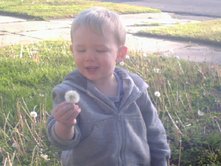
This is the sermon originally meant to be preached Feb 8 (until I became really sick prior to service time) and was rewritten and adapted for Feb 15 at Trinity Church of the Nazarene.
The picture is from "scripturepics.org" (a wondeful site I would recommend).
* * * * * * * * *
As most of you know, I was very sick this week… and really, the last few weeks.
I got blood work done awhile ago… And they were able to tell me it was not mono. It was not anemia. It was not thyroid problems… That only left 9,000 other possibilities.
Why did I not want to get out of bed? Why did I feel so exhausted?
I did not feel like getting out of bed- ever. Every little task felt like it was a marathon. Every little duty seemed like climbing a mountain… and yet I kept going; that is, until last Sunday when I crashed.
By Monday… I found myself sick in bed with a fever; unable to even lift my head to look at the time.
I had a virus, infection, and who knows what else… all at the same time. And it kicked me down.
All of us have times where we feel sick. Where we do not want to get out of bed. Where we are in bed with a fever.
Almost everyone has a story just like mine this past week… of feeling sick.
Generally, every human desires to be healthy- instead of being in bed, sick with a fever.
Just like our scripture today.
Basically the story goes like this:
We pick up where we left off with the sermon 2 weeks ago (we’re still working in Mark chapter 1 where we’ve been for the last month). Jesus leaves the synagogue where he casts out an evil spirit—and they go to the home of Simon Peter.
Simon Peter’s Mother-In-Law is sick and in bed with a fever.
… I think after this last week, I truly can empathize with her suffering.
But Jesus walks up to her bedside, takes her hand, and helps her out of bed.
…Wouldn’t I have loved that?! For Jesus to come to my bedside and instead of handing me a Gatorade and Tylenol… he would help me out of bed?
But then… this lady walks into the kitchen and starts serving them meals and adding ice to their drinks (because we all know there was ice in Jesus’ day) while Jesus heals other people.
Jesus then heads out on his own the next morning when his disciples barge in and inform him everyone is looking for him and Jesus says—we must go to another town so I can preach there too, “this is why I came.”
So Jesus travels around other places—even though people want him to stay in Capernaum and heal everyone… Jesus goes out to preach in other places too.
What a story. There’s sickness. There’s healing. There’s service. There’s preaching.
What is most amazing about this story, in the Gospel of Mark,… is how Jesus loves.
Jesus loves by healing; by serving; & by preaching.
So let’s look at these three things. What is healing? What is serving? What is preaching?
Or maybe more significantly… what needs to be healed?
Do we only need to be healed from fevers?
Do we only need to be healed from infections and viruses?
Do we only need to be healed from those times we can’t lift our heads out of bed?
…Or, perhaps, is there more from which we need to be healed?
We need to be healed from so much more.
We need to be healed……. from our disconnection.
(Rob Bell in “Sex God,” Zondervan, 2007 says), “We’re disconnected from each other and we know it.” “It’s not how things are supposed to be” (35).
In Genesis, “God creates the first people.” “The story begins with humans in right relationship—in HEALTHY, life-giving connection—with their maker. All of their other relationships flow from the HEALTH of this one central relationship—people and God” (39).
In Genesis we see Adam in a great relationship with God. Adam is healthy; no fevers, no sickness. And then he starts choosing what Adam wants over what God wants… and thus, Adam is no longer healthy.
Adam might as well be sick in bed with a fever.
Because “everything” goes wrong; Adam and Eve “choose another way,” and… “they become disconnected” (39).
And this is where we find ourselves… sick, unhealthy, & in desperate need to be healed.
We are sick, in bed, with a fever; needing Jesus to come heal us.
Needing Jesus to heal us from our sickly disconnection from one another and disconnection from God.
“We were born into a world, into a condition of disconnection. Things were created to be a certain way, and they’re not that way, and we feel it in every fiber of our being” (40).
“We’re severed and cut off and disconnected in a thousand ways, and we know it, we feel it, we’re aware of it every day. It’s an ache in our bones that won’t go away” (40).
It’s a fever that puts us in bed, sick, just like Peter’s Mother-in-law.
Some of us have various relationships that have been healed. Some of us barely hang on to the dysfunctional relationships we currently have.
Some of us have great relationships. Some of us wish we had great relationships.
Some of us experience community. Some of us wonder if true community is even possible.
And in our disconnection, our broken relationships, in our detachment from each other…
Jesus comes to some of us in Capernaum and heals us.
Jesus comes to our bedside and restores us from our disconnection from each other.
Jesus takes our hand and heals us for the purpose of serving others who are disconnected too.
Ah… And now we come to serving.
We said Jesus loves by healing, serving, and preaching. Let’s look at serving.
What is serving?
This seems like an easy one. Serving is helping others, putting others needs before our own.
… Just like Peter’s Mother-in-law. The lady was sick, in bed… and then gets up to serve.
If that’s not giving up your own needs for someone else, I don’t know what is.
….Especially since I’ve just felt sickness recently, myself. I certainly did not feel like getting out of bed and serving anyone. That’s for sure! I could barely lift my head let alone add ice to anyone’s cup.
So service… maybe it’s not such an easy one.
Perhaps service is even harder than healing (when we are restored from our disconnection).
Service involves putting aside our own needs for the connected needs of others.
Service involves giving up what we want in order that someone else might be healed from their disconnection.
Service… is quite difficult, quite challenging, quite painful- even.
Service involves blessing others—giving of ourselves to others who are disconnected, who are sick in bed with a fever from their separation from each other (and God) and they feel it deep in their bones.
Rob Bell in “Velvet Elvis” (Zondervan, 2005) says, “the church is at its best when it gives itself away” (165) to those who are disconnected and sickly.
“The church doesn’t exist for itself; it exists to serve the world. It is not ultimately about the church; it’s about all the people God wants to bless through the church.
*** When the church loses sight of this, it loses its heart” (165). ***
“The most powerful things happen when the church surrenders its desire to convert people.” “ It is when the church gives itself away in radical acts of service and compassion, expecting nothing in return, that the way of Jesus is most vividly put on display” (167).
The church is to be the one who says, “Jesus lives. Here’s a toaster” (168). Is that what you need?
“Jesus lives. Here’s a fruit basket. Eat healthy this week.”
“Jesus lives. Let me tutor you in math.”
Service—is the blood that flows through the body of Christ, the Church of Jesus Christ. It’s how we are. It’s who we are.
What about preaching? What is preaching? If Jesus shows love by preaching, what is it?
Preaching—is sharing the good news. Preaching is telling about what God has done and is doing.
Preaching—is telling our story.
But what is the good news and what has God done? What is God doing?
What is the STORY we share?
There are times in life… where we FEEL and SENSE the connectedness; where we see clearly where Jesus has healed us from our disconnection.
Have you ever thrown back your head in laughter with a friend and you sense the connectedness to that person?
Or have you ever been smacked in the face with how connected we are—those moments that blow away any disconnected feelings in our bones we have…. Those moments where we say things like, “wow- it’s a small world after all.”
Most of you are familiar with Kaza Fraley, the pastor at Mulvane. She’s the one who co-authors the devotions you all received during Advent and will receive again during the season of Lent.
Kaza reminds me of how connected I am.
We both grew up in Maryland. She went to Eastern Nazarene College, 4 years later… so did I. She went to Seminary, 4 years later… so did I. She went to pastor in Wichita, 4 years later… so did I. And we met in Romania. We’ve been in the same place 5 times. When she moves, watch out; ‘cause I know where I’ll be in 4 years.
Crazy things like that… remind us of God’s healing; of our connection to each other because of our God.
There are times in life… where we FEEL and SENSE the connectedness; where we see clearly where Jesus has healed us from our disconnection.
Those moments where we SEE Jesus’ healing touch in relationships. Where we WITNESS God’s wholeness and healing for creation.
I was putting my two year old, Jayden, to bed the other night and we were laughing. Instead of calming down with story time he was making silly faces and carrying on—being a 2 year old comedian. And as we were laughing together I thought, “ah… this is connection.”
“I’ve truly been healed.”
As Rob Bell says (in “Velvet Elvis,” Zondervan, 2007), There are times where we feel “overwhelmed with the presence of something or somebody” where it is “so good, so right, so true, so safe” (72).
Other examples of connectedness could be… the birth of a baby (have you ever held a brand new baby in your arms when the little one wasn’t screaming?), or watching wild animals at play, picking up a baby in the orphanage, or time with friends (72ff).
These are times where we sense the “holiness of it all. The sacredness of the moment,” that feeling that “we’re going to make it” (73).
There are times we sense the connectedness of it all; the holiness of our healing from being disconnected.
I spent some time in a Romanian orphanage. Some of you know this. I went to Romania for 10 weeks while I was in college.
One of my greatest stories of a moment of connectedness… of that awareness of deep holiness of how I’ve been healed from my disconnection… happened in an orphanage.
Since I was a young kid (9 or so), I wanted to go to Romania. In fact, one of the reasons I ended up choosing to go to Eastern Nazarene College was because they offered the Romanian studies program—where students could study abroad while also serving abroad.
I learned about all of this in school and I wanted to do something about it because I saw many of those suffering… were children and babies... Even infants.
I wanted to go just hold even one baby; to bring comfort, wholeness, CONNECTEDNESS to just one little baby.
When I finally arrived… when I reached my arm up over the crib… I felt that holy connectedness surge through my body.
Let me read to you an excerpt from my sermon upon my return from Romania:
“the day came where we could finally go see the children in the hospital for sick and abandoned babies. We could not hold them- because we were Americans and our test results (on if we were dying of strange diseases) had not come back yet… so we could only play with the babies by reaching our arms through their cribs. I will never forget the feeling of years of wanting to just touch and comfort a lonely, emotionally, love-starved child… and then you touch them and something just surges from your hand.” My friend, “watched amazed as I walked up to a little boy and tickled him and he laughed with the deepest belly laugh… and he laughed and he laughed… and then they made me leave. But then we went to another building- in this building the babies were really tiny- My friends and I dispersed around the room and I ended up in a corner with what I thought was two girls… later time taking care of his ‘essential needs’ (like diaper changes) proved otherwise… But I remember walking up to this child and watching him smile at me and interact with me… and at that point and time- I knew why I was in Romania. I was there to love that little boy named Ilie (which is Romanian for Elijah).
I knew why I was in Romania… I was in Romania to be arms of connectedness. The place I stood and touched the cheek of an orphaned baby was holy ground—because it screamed of beautiful connectedness.
When Kaza and I reminisce about our crazy friendship, I sense the connectedness.
When I go to the hospital to hold a brand new baby, I sense the connectedness.
When I go home to Virginia and see the gorgeous mountains that seem to be endless, I sense the connectedness.
When my 2 year old, Jayden, and I laugh together… I know I’m connected.
….We are disconnected from each other and we know it… but there are moments where we sense the holiness of connectedness—of the healing Jesus brings.
It is in moments like these… moments where you’re silenced because you connect to someone who’s disconnected… Where you know why you are in foreign lands… when you know why you’re preaching on the job or on the street—when you look out across the wheat fields and see the wind blow… when you watch a young child laugh…
… these are the times you’re aware of the holiness of God. These are the times you sense the connectedness of it all.
And I’m guessing everyone here has 1000 stories of your own… of connectedness you could share.
Jesus LOVES by healing, serving, and preaching.
And what are we preaching… we are preaching of the healing Jesus brings to our disconnection. We are preaching of the holiness of our connectedness. We are preaching of the love that unites us.
We preach—by telling the story of our healing from disconnection.
We preach—by living the story of connection.
For as it is often said, “Preach always, if necessary—use words” (St. Francis of Assisi)
Jesus loves by healing, serving, and preaching.
Healing disconnection.
Serving by helping others who are sickly and disconnected.
Preaching the stories of the times and ways God works to redeem disconnection.
Preaching about our memories of the times we saw the connectedness of it all… on a trail out in a park, walking through wheat fields, peering into a newborn baby nursery in the maternity ward, holding the hand of a friend who’s suffering… and the list goes on and on.
Our lives are filled with holy moments—moments where we sense, feel, and taste reconnection—where we are aware of the healing Jesus has done for our disconnection.
Moments where we swear God could ask us to take off our shoes because the place we are standing is holy ground.
Our lives are filled memories and stories of those holy moments. And this is the message we preach.
Because we are healed from our disconnection, we must also LOVE as Jesus loves.
We must also heal, serve, and preach.
We must heal the disconnection and sickness around us.
For… As in our scripture today, not everyone was healed in Capernaum that day. Not everyone was healed during Jesus’ visit to that particular town—he had to move on… this is why Jesus came; to preach and heal the world beyond Capernaum.
Jesus left the rest of the healing in Capernaum to those who had already been healed in that town.
They were healed to serve. They were healed so they might continue to spread healing around in Capernaum, to preach of the one who brings healing and hope.
And thus… As people who have a message of wholeness… as people who have a message of connectedness. As people who have stories of healing—from our disconnection… We must serve those around us once we are healed; once we are healed from our disconnection.
We must preach to the sick. We must tell the story of the times where we are left speechless in the amazement of connection… to orphan babies, to our friends, to our family, to those we serve outside the church building.
We must preach of reconciliation and connection to those who are still sick and in bed with a fever; to the sinner, to the poor, to the outcast.
This means when we leave here we must LOVE and continue on Jesus’ work and ministry. His physical body is not here in this town to heal the sick here in Capernaum; in Wichita. They are looking for Him. They are sending Simon and his friends out to look for Him.
We are the ones who are Jesus’ body on earth… who must finish the work in Capernaum; in Wichita.
We must love through healing, serving, and preaching.
We must heal… in our relationships. We must connect with other people.
We must serve… others who are still desperate to connect. Who are still sick, in bed with a fever; who are dying from their disconnection, feeling it deep within their bones, hoping they will not always feel so disconnected and know it.
We must preach… and remember the times Jesus gave us wholeness and healing… and share the memories with others.
Let’s pray together.
Dear Lord God,
The one who heals us; we come before you asking for your healing touch now. Heal our dysfunction. Heal our broken relationships. Heal our disconnection.
We are disconnected and we know it. We feel it in our bones.
Connect us to one another. Make them loud memories… so that we might preach of a healing and restoration to a world living in disconnection.
May we learn how to serve those still sick in bed with a fever of disconnection.
Teach us how to preach our memories of being connected. Teach us how to allow our lives to be shining examples of service. Teach us how to tell our stories of connecting to one another.
God, take all of who we are and all of who we hope to be—and make us more than we ever dreamed.
Make us more connected. Make us more intertwined. Make us more united.
We love you Lord, Amen.








